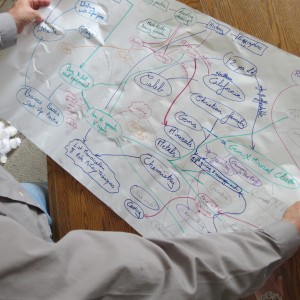The difference between mediocre and great talent performance is due to the number of practice hours. That observation is not surprising. What is surprising is the reason for the difference between great performance and knock-down world-class performance, according to Geoff Colvin in his book “Talent is Overrated”. The difference is due entirely to participating in more systematic and planned-out type of practice hours. Doubling from 2 to 4 hours of daily practice will make you great, but doubling from 4 to 8 hours will not make you a world-class performer.
Tag: find it early
Four Practice Principles: Deliberate, Intelligent, Distributed, Over-the-Top
1. Deliberate Practice: practice like you mean it! Push yourself to do it better than the last time around
2. Intelligent Practice: study how each individual part of your talent can be improved and make an actionable plan to improve each part
3. Distibuted Practice: borrow and copy pieces of excellence from fields of talent other than yours and recombine into your own performance
4. Over-the-Top Practice: practice 4 hours each workday of every week for 10 years and you will cross over the 10,000 hours
Humble Talent Start is Good for Discovery

When you help your child start a journey of 10,000 hours of talent building, it can feel in the beginning like you are riding a bicycle on the backroads, when you would rather be driving on a highway with a big, fast SUV. It feels like that because the beginning is in fact humble and slow. But humble and slow in the beginning stages of building talent gives you time to discover which part of the talent thread you want your child to pursue with bigger, more expensive tools. Don’t over-invest in the big, wrong tool that can get you fast to where you want to go. Stock-pile your energy and money to make bolder investments once your confidence has grown that you are on the right talent track.
Mind Map of Potential Talent Development

Read Biographies of Talented People

When studying a particular time period in the course of your standard homeschooling curriculum, have your son or daughter choose to read a biography of an individual who excelled in some particular area of focus related to his long-term term interest. This is not only a great way to build a deep understanding into the 10,000 hours of talent building, it is also a great way to peg general historical facts into a living context. History becomes very detailed and real because as he accumulates his reading of specialized biographies, he increases his ability to understand the general limitations and opportunities of a specific time period. For example, knowing the amount of timber, effort, and cost that smelting ore for 130+ warships in 1588, before the advent of Bessemer process, it really brought home to my 12 year old son the scale of the Spanish Armada preparing for war with the English. He was already familiar with some of the dramatic advances that new smelting techniques had brought to the world in the 1800s, so when he reads of vast quantities of copper and iron being smelted before those technological advances, he could correctly assess the deadly seriousness of the Spanish Armada in the 16th century.

Find Club to Support Long Term Learning Goal

Find a club that supports an aspect of your child’s long-term learning goal of building 10,000 hours of world class talent. This is a great way to socialize your child into the culture of a specialized interest and get to hear first-hand about other learning opportunities that would never be broadcasted elsewhere. The best clubs will often be the ones geared for adult practitioners as your child will invariably get great feedback and advice. My metals and minerals focused son goes weekly to a gem and mineral club that has been meeting since the 1930s. I accompany him as his adult supervisor so he gets a chance to play and use tens-of-thousands of dollars of expensive equipment and hundreds of years of combined experience in one room.

